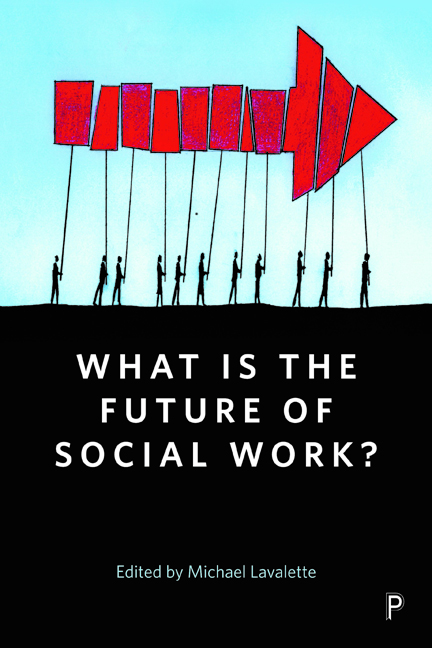Book contents
- Frontmatter
- Contents
- List of Figures and Tables
- Notes on Contributors
- Editor’s Acknowledgements
- Foreword
- Introduction: What is the Future of Social Work?
- 1 Austerity and the Context of Social Work Today
- 2 Contemporary Developments in Child Protection in England: Reform or Reaction?
- 3 The Slow Death of Social Work with Older People?
- 4 Mental Health Social Work: The Dog that Hasn’t Barked
- 5 Learning Disabilities and Social Work
- 6 Social Work by and for All
- 7 Anti-Oppressive Social Work, Neoliberalism and Neo-Eugenics
- 8 From Seebohm Factories to Neoliberal Production Lines? The Social Work Labour Process
- 9 Social Work and the Refugee Crisis: Reflections from Samos in Greece
- Conclusion: The Road to an Alternative Future?
- References
- Index
Conclusion: The Road to an Alternative Future?
Published online by Cambridge University Press: 03 March 2021
- Frontmatter
- Contents
- List of Figures and Tables
- Notes on Contributors
- Editor’s Acknowledgements
- Foreword
- Introduction: What is the Future of Social Work?
- 1 Austerity and the Context of Social Work Today
- 2 Contemporary Developments in Child Protection in England: Reform or Reaction?
- 3 The Slow Death of Social Work with Older People?
- 4 Mental Health Social Work: The Dog that Hasn’t Barked
- 5 Learning Disabilities and Social Work
- 6 Social Work by and for All
- 7 Anti-Oppressive Social Work, Neoliberalism and Neo-Eugenics
- 8 From Seebohm Factories to Neoliberal Production Lines? The Social Work Labour Process
- 9 Social Work and the Refugee Crisis: Reflections from Samos in Greece
- Conclusion: The Road to an Alternative Future?
- References
- Index
Summary
In Reisch and Andrews’ (2002) classic book on the history of social work in the US the authors look at the ‘road not taken’. Their argument is that there has been a rich and varied past within social work, and that, at key turning points, the profession followed certain ‘roads’ or ‘paths’ which has led us to where we are today. By following these roads, however, alternative approaches and visions regarding what social work could or should be were closed down. Reisch and Andrews make clear that the development of the social work profession is not a simple linear process. Knowing our (contested) histories, recognising how things have been different in the past, enables us to consider the possibility of a different present and an alternative future. And there are always alternatives: different ways of conceptualising social problems, different priorities for social engagement, different values to shape our practice, different goals to social intervention. It is possible to do social work in diverse ways; it doesn't have to be like this.
Collectively, the authors in this book share a concern that we are fast approaching a key fork in the road, with the social work profession facing a question over which road to take: what kind of social work do we want to see, and what kind of a profession do we want to be part of? Is it one shaped by targets and markets, with workers processing people at the behest of an increasingly brutal and brutalising ‘welfare’ state? Or is it one that, in the face of the present crisis (of cuts, austerity and managerialism) asserts its independence, its values and its belief that ‘another social work is possible’?
Collectively we are of the view that the years of austerity need to be brought to an end – urgently. Collectively we believe that the growth of inequality, poverty and, in contrast, the obscene ‘conspicuous consumption’ of the fabulously wealthy is damaging to the fabric of our society. Collectively we believe that years of cuts, marketisation, welfare transformation and restructuring are damaging people's lives.
- Type
- Chapter
- Information
- What Is the Future of Social Work? , pp. 161 - 164Publisher: Bristol University PressPrint publication year: 2019



